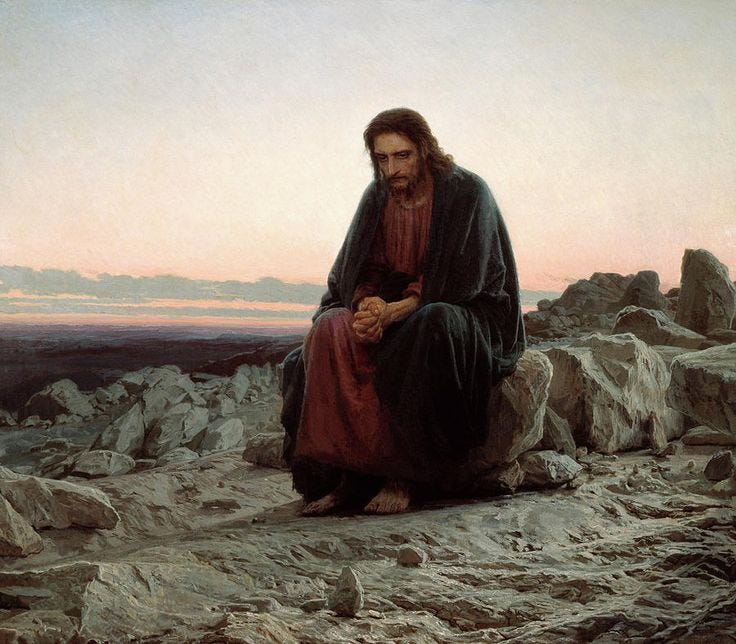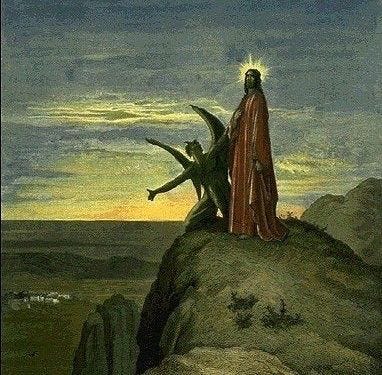"I'm Not Religious, I'm Just Spiritual"
A convenient belief system, isn't a belief system at all
Welcome to this week’s edition of Write & Lift. If this is your first time reading, subscribe here. I’m thrilled to announce that this week, I’ve collaborated with
in writing this piece. If you haven’t followed his newsletter, please do so. He’s a sharp writer with his finger on the pulse of our current cultural decline.One quick thing:
If there is a recent essay or edition that has sparked your curiosity, given you a new idea, or in any way contributed positively to your daily life please consider supporting Write & Lift with a $5 monthly subscription. I want, more than anything for W&L to remain something you look forward to reading each week and your support helps me to gauge if I am on the right track. While I don’t write to make money, any small contribution is greatly appreciated. Additionally, if there is a specific topic, idea, or book you’ve read recently that you’d recommend I dig into, let me know in the comments below!
"I'm Not Religious, I'm Just Spiritual"
We’re in a paradox of belief.
While rates of religiosity among young people in the West have steadily declined for the last thirty years, our culture and politics are in a tight grip of religious zealotry. Walk through a College campus in the United States and you’ll see it. Esoteric symbols and icons tattooed on bodies. Spiritual symbolism from Eastern traditions. A fanatical adherence to the “God-Mother” of nature and utopian political movements aimed towards a “leveling” of mankind. The casual dismissal of moral codes in favor of radical subjectivism.
You wouldn’t blame someone for being shocked to find icons of Christian Saints and Crosses on the walls of a University in Riyadh. You would think, “Something is not right” seeing Japanese school girls wrapped in burqas on the Tokyo metro, but our disconnect from our religious foundation in the West is something we’ve all just casually accepted.
For many reasons, we’ve been unable to pass down our religious and moral traditions to the next generations. But that never stopped them from seeking.
In the West, Christianity has been undermined by “spirituality”; an undefined, self-declared, contradictory, disconnected form of metaphysics that loosely defines the belief systems of millions of young people.
It’s the belief system of the blind seeker. Those who are desperate to believe in something, but want to do without a hierarchy, tradition, or moral code of conduct. It is a justification for impulsivity. A hubris that is bound by the idea that the flawed individual can be the centerpiece of all wisdom. It’s a desire to have your cake and eat it too.
I know, because I used to self-identify as a “spiritual” thinker. I rewrote my grand theory of the universe each time I read a new book or heard a new TedTalk. I walked down lines of moral subjectivity; continually justifying my poor actions and the actions of others. Exhausting myself physically, mentally, and spiritually by living a life with no limits, no real value structure, and no tradition.
Here’s what I learned about myself coming out the other side.
The Spiritual Justification
I grew up in a Protestant Christian household. Or so I thought.
My parents are what might be called “non-practicing”; religious only when convenient. The teachings of Jesus I learned about in Sunday school, didn’t align with what I saw at home. Many who have returned to the faith likely share a similar background. I saw the hypocrisy of my parents and it forced me to ask a question: why should I take what I’m being told seriously in Church if my own family doesn’t live by these rules?
By the time I was in high school, my faith had evaporated. I’d become a staunch “spiritual atheist”. The God I had been taught about as a child, was replaced by a “life force” of the universe. I mocked organized religion and became a devotee of New Atheist thinkers like Christopher Hitchens and Sam Harris. I held myself to fleeting and abstract moral standards. I’d latch onto a new intellectual hero each month without considering the moral depth or sincerity of their positions.
While I was “faithless” on the outside, I sought answers more than the most dogmatic believers at my old church. My “spirituality” gave me a title to use in conversation with others; it gave me a sense I was on the right path. But when I set my head on the pillow to sleep each night, that same sense of hollowness persisted.
Freedom Requires Constraint
Spirituality is an empty word.
It means something different to everyone. It’s a moving target. A linguistic contradiction.
When someone says they are spiritual, they could be saying that they believe in a force or omniscient deity, an ancient pagan tradition, a sense of inner calm found in states of meditation, or a hundred other things. There are no set-in-stone moral codes enforced by this “spirit”. The believer is given free rein to act as they please, engaging passively with these abstract codes without any form of moral or social constraint.
Spirituality does not draw moral lines, it demolishes them. It makes man the center of the universe instead of subjugating his moral fallibility to a religious system and community. In 2024, men can become women, white people are inherently racist; they’re no longer pedophiles, they’re “Minor Attracted Persons”, and so on. These are symptoms of radical subjectivism. It’s no surprise why we are seeing the goalposts of acceptable opinion being pushed further over the edge of insanity. We’ve lost the structure and moral codes that faith provides.
Ironically, the freedom that people think they are finding by turning away from religion constrains them long-term. This is the reason why early Christians escaped the secrecy of underground churches and spread the teachings of Jesus throughout the Roman Empire thousands of years ago. The late Roman Empire was in a state of social degeneracy. And the Christian Church provided a map and system for a better, more fulfilling life. The impulse to seek and explore doesn’t disappear with faith, it is amplified and channeled in a direction that allows us to thrive as individuals and navigate current social issues with clarity of conscience. As Jesus himself said; “For what shall it profit a man, if he gain the whole world, and suffer the loss of his soul?”
Who is more free? The man who understands the danger of the wild and can successfully navigate through it. Or the man who wants an adventure, but whose ignorance gets him swallowed by a wild animal?
The Earth worship and neo-pagan belief systems that many “spiritual” people uphold, may have some rudimentary theology and moral code. But without the community and accountability that real faith provides, it becomes nothing more than an esoteric interest. What I had in common with the archetypal “astrology girl” was that I wanted freedom from moral restraint. What I found was a shadow; anxiety, depression, and a group of people surrounding me who always sought, but never found.
This isn’t a true belief system. But it felt convenient at the time.
After many years, I returned to my Christian faith, realizing that the hubris with which I denounced my faith, didn’t end my seeking. It only made it worse.
The New False Idol Of Spirituality
Think about what new-age, individualistic spirituality really is: a “do-it-yourself” kind of doctrine in which every individual is free to choose what rules to follow and which ones to disregard. What that means, simply put, is that spirituality means absolutely nothing, as we mentioned at the beginning of this article. When a term can mean whatever each individual wants it to mean, it fundamentally means nothing at all.
This secular, individualistic spirituality serves as a very effective mirage to hide one of the most dangerous false idols in our postmodern world: that of the self. To believe yourself entitled to just pick and choose what’s best for you and society at large is giving yourself way too much credit, and believing your own, flawed human criteria to be above the timeless teachings of Christianity.
As an example from my own life, some years ago I called myself a Christian, and while I did try to follow the teachings of The Bible in 90% of situations, I still told myself I knew better when it came to sexual immorality, and I constantly justified my lack of restraint and my inability to move away from sinful behavior by trying to get myself to believe my criteria was above that of God.
Spirituality without religion is the same as self-worship. It’s idolatry of the worst kind. It requires a deep arrogance because, at its core, you believe yourself to be wiser than all the things that have sustained you until this point. You believe, at your young age, with your long list of flaws, that you simply “know better”.
It Takes Great Humility
It’s not easy to open your eyes to how much idolatry goes on in your life. I’m not fully free from it either. I very often fail to hold God at the center of what I do and fall prey to temptations and sin. We all do, and that’s just our nature. But the first step towards sanctity is to be humble enough to accept your flawed nature so that you can remove yourself from the center and place God there, even if you sometimes forget or fail to do so.
Spirituality without religion gives your flawed self way too much credit. You don’t know better. Neither you, nor me, nor any single human being has enough wisdom on his own to successfully navigate the overwhelming complexity of life. But what’s beautiful is that we don’t have to do it on our own. We can simply choose to follow God as best we can because He does know best.
As always, thanks for reading
-Joe, SimpleMan













Great discussion. Tempus fugit, memento mori